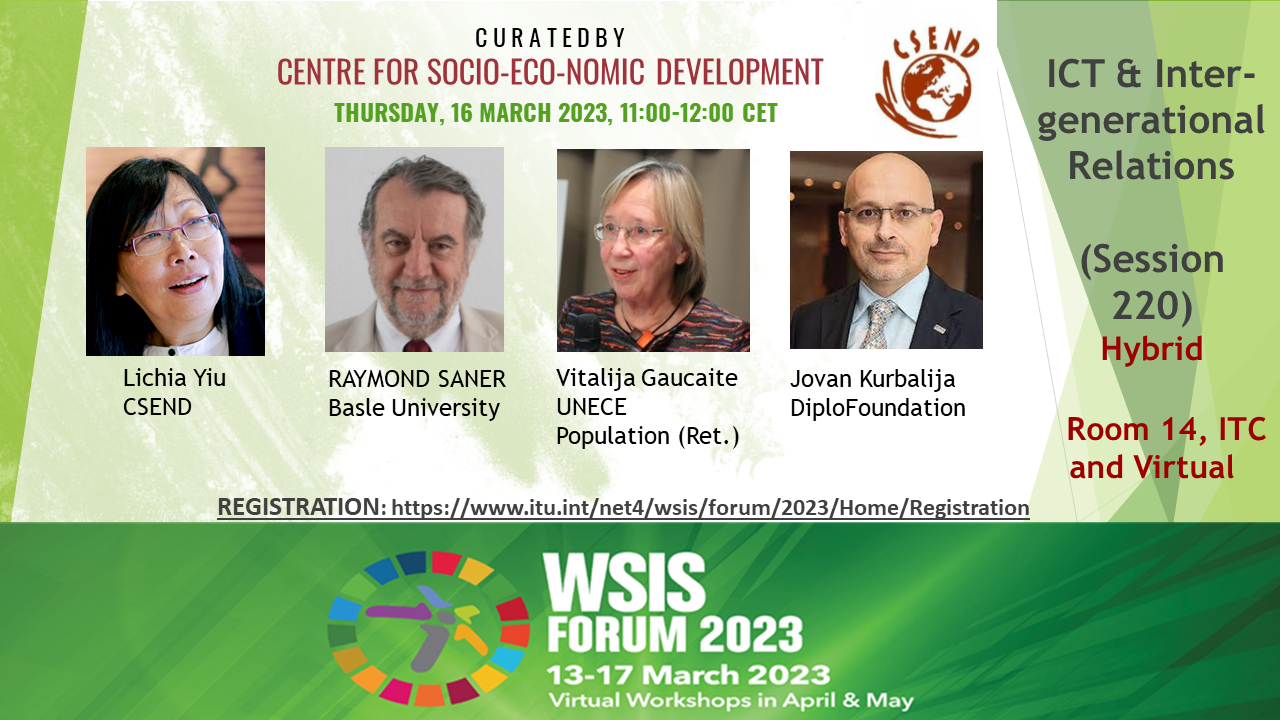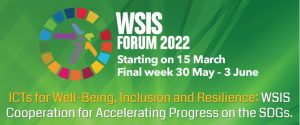Active Aging- Aging with Dignity and the SDGs

Intergenerational partnerships mean that “all generations work together to create change, rather than having to compete for their right to participation” (The Youth – Friendly Guide to Intergenerational Decision Making Partnerships, 2004).
Creating intergenerational partnerships is challenging and will not happen overnight. This WSIS Special Initiative and Special Tracks brings together the stakeholder groups to explore and discuss how such partnerships could be created, facilitated and fostered to contribute to a sustainable future for all.
Raymond Saner (2023): “Older Persons, Digital Products and Standards: The need for consumer protection and support for continuous learning of older persons”, in Social Aspects of Ageing- Selected Challenges, Analyses, and Solutions, Edited by .Andrzej Klimczuk; open access journal: DOII:10.5772/intechopen.108983
This chapter addresses the need to help older persons adjust to the digital age and describes major challenges that aging persons as well as persons of all ages have to face in light of today’s virtual realities. The author proposes how to best facilitate and support older persons coping strategies and how they can obtain and maintain adequate digital literacy and ability to use existing digital resources. The article describes the hidden costs of the digital age for older persons and offers six solutions how these digital challenges could best be overcome from individual, social and public policy perspectives.

WSIS 2022: Digitalization and the future of work through inter-generational collaboration, panel organized by Raymond Saner, CSEND with following contributions: “Workforce aging, productivity and industrial structure in Europe (Prof. Iñigo Calvo Sotomayor, Deusto Business School, Bilbao, Spain); “Digitalization and the future of work through inter-generational collaboration- the case of Hong Kong” (Prof. Peter Fong, Ph.D, President, HK Public Administration Association); Intergenerational Collaboration on ICT: the AAL experience- a comparative analysis” (Klaus Niederländer, Director, Central Management Unit, AAL , Brussels); “ ICT voluntarism by young people to improve older persons’ digital literacy in China (Prof. Dr Yifan YANG.; Deputy Director, NIIA, Southwest Jiaotong University, Chengdu, China) and “Digitalization, future of work and participation across age groups” by (Prof Lichia Saner Yiu, President, CSEND, Geneva).
A session at WSIS Forum 2019, Geneva
Monday, April 8 2019, from 4:30pm to 6:15pm, Room M, ITU
Information and communication technologies (ICT) have extraordinary potential to help with the response to the demands of a major demographic shift, including meeting the challenges of a shrinking workforce and improving healthcare and caregiving for older persons. Yet key challenges exist that need to be addressed, including accessibility of these technologies and digital skills for older persons. This panel will explore how older persons are using ICTs to ensure positive change for themselves and others, manage age-related challenges, and overcome risks, barriers and stereotypes. It will include speakers from a variety of stakeholder groups.
No international convention exists so far that would offer protection of older people. However, different initiatives have been launched to bring to the public’s attention that older people often experience severe discrimination (Ageism) and appalling situation in elderly care institutions and even at home in the context of family. The following institutions are contributing to the international efforts to create policies and international agreements that could lead to an international convention for the protection of older persons.
Statements prepared by CSEND and presented during the 9th Open-Ended Working Group on Aging (OEWGA). held in New York on 23-27 July 2018 at UN Headquarters in New York City